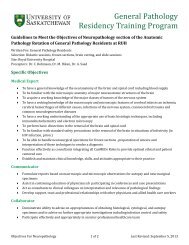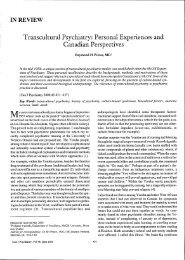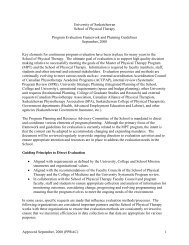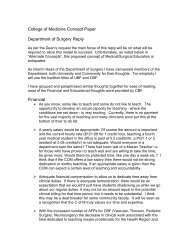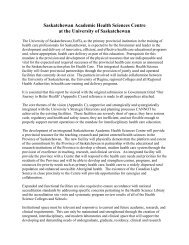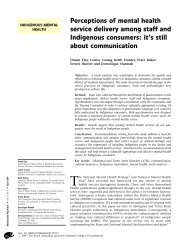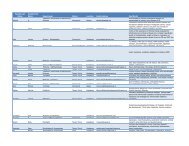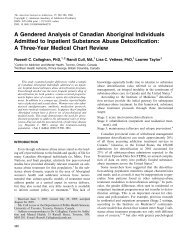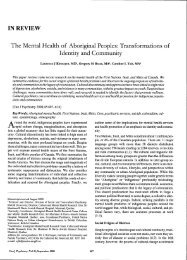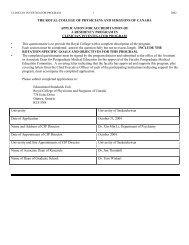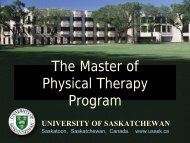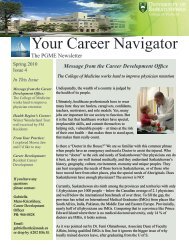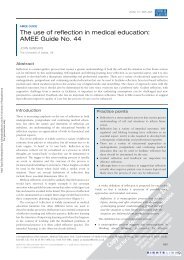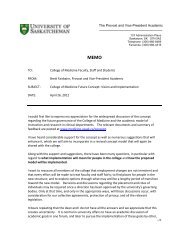COMMUNIQUé - College of Medicine - University of Saskatchewan
COMMUNIQUé - College of Medicine - University of Saskatchewan
COMMUNIQUé - College of Medicine - University of Saskatchewan
You also want an ePaper? Increase the reach of your titles
YUMPU automatically turns print PDFs into web optimized ePapers that Google loves.
social ACCOUNtability<br />
The Social Accountability committee<br />
has met with departments throughout<br />
the <strong>College</strong> <strong>of</strong> <strong>Medicine</strong> to gain an<br />
understanding <strong>of</strong> existing activities that<br />
could be described as socially accountable.<br />
Reflection on these discussions led the<br />
committee to describe four key areas<br />
<strong>of</strong> activity within a medical school:<br />
summarized by the acronym CARE.<br />
• Clinical activity: addressing priority<br />
problems, being responsive to changing<br />
community needs, including overcoming<br />
barriers to access<br />
• Advocacy: speaking out on behalf <strong>of</strong><br />
underserved populations or neglected<br />
conditions and working with partners<br />
and policy-makers to translate a vision <strong>of</strong><br />
a socially accountable patient-centered<br />
health care system<br />
• Research: conducting curiosity-based<br />
research that is responsive to perceived<br />
needs and translated into evidencebased<br />
practice and quality care<br />
• Education and training: on-going<br />
modeling and teaching pr<strong>of</strong>essionalism<br />
and community-responsiveness,<br />
providing opportunities for servicelearning<br />
and seeking to incorporate<br />
social accountability into practical<br />
training and continuing education<br />
throughout practice life<br />
Beyond clever wordplay, the CARE model<br />
is a useful tool, helping to guide social<br />
accountability initiatives towards the<br />
priority health concerns <strong>of</strong> local, regional,<br />
national and international communities<br />
while working towards a health system<br />
that is more responsive and socially<br />
accountable.<br />
Student initiative has driven the<br />
development <strong>of</strong> numerous social<br />
accountability subcommittees in our<br />
<strong>College</strong>. These subcommittees work<br />
to address key issues relevant to the<br />
communities served by the <strong>College</strong> <strong>of</strong><br />
<strong>Medicine</strong> and have had far-reaching<br />
impacts on the <strong>College</strong> and the local<br />
and global community, from changes in<br />
curricula and admissions to community<br />
programming and international<br />
educational experiences. Some <strong>of</strong><br />
the current groups include:<br />
Aboriginal Health Committee: recognizes<br />
the significant health disparities faced<br />
by the First Nations and Métis people <strong>of</strong><br />
<strong>Saskatchewan</strong>, and attempts to better<br />
coordinate ongoing activities in the <strong>College</strong><br />
<strong>of</strong> <strong>Medicine</strong><br />
Aboriginal, Rural and Remote Health<br />
Group: hosts speakers and carries out<br />
community tours to deepen student<br />
understanding <strong>of</strong> health in Aboriginal and<br />
rural communities<br />
s<br />
<strong>University</strong> <strong>of</strong> <strong>Saskatchewan</strong> • <strong>College</strong> <strong>of</strong> <strong>Medicine</strong> C O M M U N I Q U É 3



